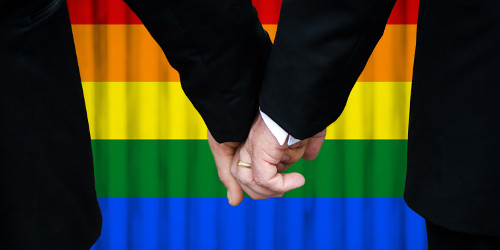
It's one of the hardest decisions couples planning to tie the knot have to make: Who should officiate the ceremony? Some attend church regularly and have faith leaders who for them are an obvious choice. But for many more couples, finding just the right person to join them as one is a challenge.
Finding the right officiant – one who can tailor make a wedding service to remember – isn't as difficult as one might imagine. It really comes down to comparison shopping and taking the time to meet with two or three potential officiants to find the one with whom the couple feels a true connection.
"Couples who are truly interested in what is being said at their ceremonies should be working with officiants that have that connection with them and that connection only comes from a face-to-face interview," said Stephen Stawicki, an officiant and master bridal consultant who owns The Marriage Connection with his wife Miriam Jerris, a Humanist rabbi. "Couples just don't want to take the time."
Mark Ephraim, a wedding planner for the past 50 years and an officiant since 2012, said that once a couple has chosen an officiant, they should plan on meeting with them multiple times before their big day.
"My method of planning the perfect ceremony consists of meeting with my couple two to three times," Ephraim said. "The purpose is to get to know them well enough to write a personal ceremony that will reflect their lives, love for one another, and their marital values. Sometimes it may take an extra meeting or two based on how forthcoming they are with their story. It usually only takes two. Then I write the ceremony and send to my couples for their approval or edits. It's all about them. The words I choose are based on their thoughts and feelings about their love story and love and marriage in general. Sometimes I will include a poem or reading that I find fitting to them. Sometimes they give me one they would like me to include as well."
Often times, it's helpful to see samples of an officiant's work.
"The couple needs to think about what they want and what they don't want," said Jerris, who has been officiating ceremonies for 30 years. "They should ask questions. And the officiant needs to be clear about what they offer, how they work, and what their ceremonies might look like. I have ceremonies that I share with them and I also have some videos that they can see as well."
Brad Munce, an officiant and life-cycle celebrant who owns Sacred Journeys, also said that the key to selecting the right officiant comes with finding one with whom couples feel a connection.
Couples "really need to look for someone who they have chemistry with, and by that, I mean that they are comfortable and actually like the person," said Munce. "This will make all the difference in the world. If the couple feels intimidated or rushed, or that their needs are not being met, they will be less content with the final result. I bring a lifetime of experience and spend time with my couples, listening carefully to their vision, helping them create the type of personalized and meaningful ceremony they desire.
"My approach is to be there for them, with them, helping them to enjoy their celebration as much as possible with warmth, encouragement and a sense of humor," Munce continued.
"Your officiant should take the time to understand your beliefs, your values and what makes your relationship unique. I will never hand you a ceremony and then ask you to show up. Couples are the co-author of their ceremony."
How They Got Started
It's not difficult to become an officiant these days. But the individuals who spoke to Between The Lines for this article are all experienced and possess a great compassion for people and a love of, well, love.
For Jerris, officiating at wedding ceremonies was a natural extension of her work as a rabbi.
"I first became certified as an officiant as a Humanist Celebrant, reaching out to people of different and multiple cultures," Jerris said. "My first wedding was April 1985. It was in the Boston-Edison section of Detroit in an old mansion. The bride was Asian and not religious; the groom Jewish and identified culturally. They wanted a ceremony about who they were. It was right up my alley. I was so excited."
Munce, a social worker, became an officiant by accident.
"Four years ago I was asked to plan and facilitate a memorial service for a client's family in northern Michigan, where I was serving as an executive director for a nonprofit agency," Munce recalled. "A few months later I was asked by a friend who was already legally married if I would officiate at their beach wedding in Livingston County. From there it sparked an interest to companion couples in one of the happiest moments on their lives together. I have always enjoyed being a part of people's milestones as they navigated through life as an empowering social worker in the mental paradigm. Now it had begun to become full-circle to incorporate my interfaith values of compassion combined with my gift of public speaking to craft personalized love-ceremonies with people of all beliefs and value systems."
After decades of planning wedding ceremonies for couples it was perhaps inevitable that Ephraim would venture into officiating eventually.
"In 2012 I was planning a wedding for a couple my age and we became friends and they asked me to officiate their wedding," Ephraim explained. "Although reluctant at first I found the experience to be the most rewarding of my entire career both emotionally and spiritually. I decided there and then it would be the next phase of my life-long career."











